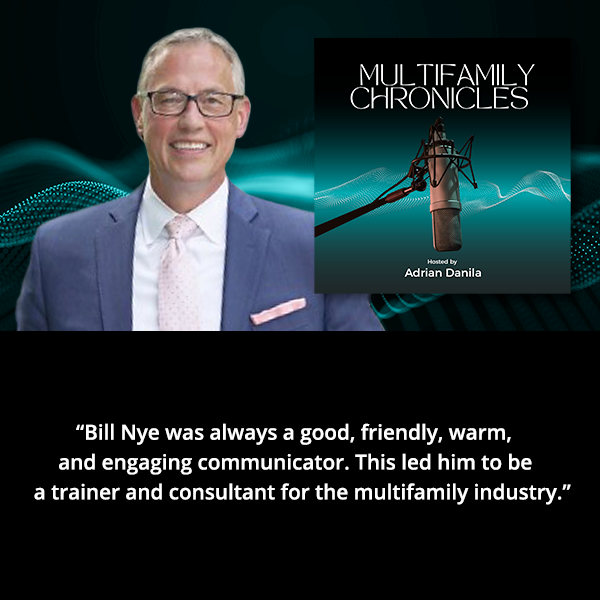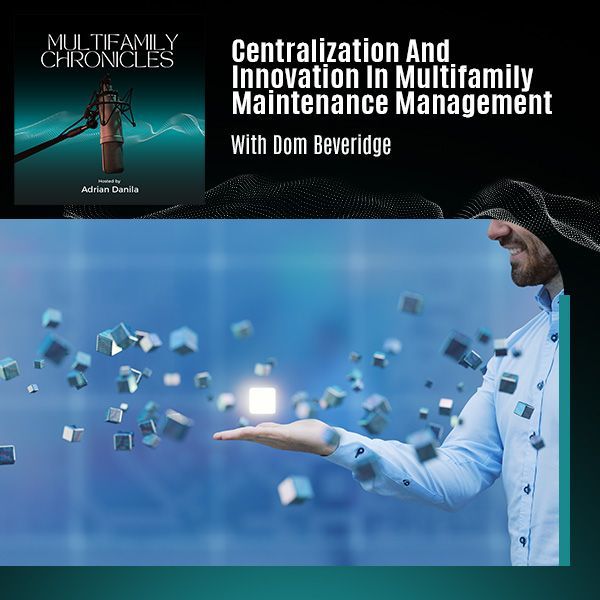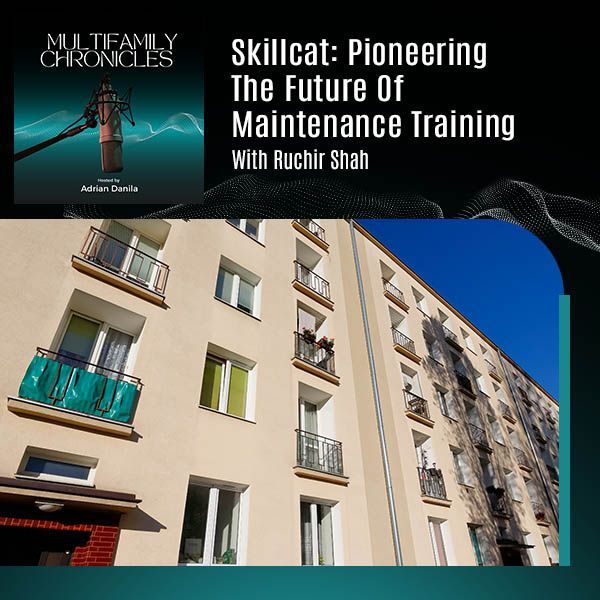The Great Awakening: Creating A Workplace Culture Worth Staying For With Bill Nye
A company’s culture is always a mirror of the leader. Everything starts from the top. So if your boss is a tyrant, you’re going to have a strict and toxic culture. Leaders need to start taking a look at themselves so that they can start cultivating a healthy culture. Because if leaders don’t stop making it all about them, employees will leave. People are more willing to leave right now because they value their time more than ever. If they get an offer from a company with a better culture on the other side of the road, they are going to take it. Join Adrian Danila as he talks to professional speaker, trainer, and multi-family consultant, Bill Nye. Tune in as they talk about leadership qualities, the great resignation or awakening, social media, cultivating workplace culture, and much more. Learn how to be a boss people want to work for.
---
Watch the episode here
Listen to the podcast here
The Great Awakening: Creating A Workplace Culture Worth Staying For With Bill Nye
This is episode number 34. Our guest here at the show is Bill Nye. He is a professional speaker, trainer, and consultant for the multifamily industry. Welcome to the show, Bill.
Thank you. It's good to be with you.
To get started, tell us a little bit about your background, both personal and professional.
I have a little bit of a unique background. I started working in the multifamily industry in 1994 as a maintenance supervisor at an apartment community in Durham, North Carolina called South Point Apartments. I knew nothing about apartments. I'd never lived in an apartment. I had never worked at an apartment community, but I knew maintenance. I knew how to fix things.
Prior to that, I had been a tech rep for York International. I was a heat pump advisor for York. I knew heating the air condition inside and out. Prior to that, I was in the United States Air Force as an air aircraft mechanic and as a flight engineer on a C-141 Starlifter. I learned how to read a schematic. If you can read a schematic on a large jet like a C-141, you can read a schematic on a dishwasher, refrigerator, or anything because they're very simple compared to that.

That background prepared me from a technical standpoint to be a pretty good maintenance guy. I learned quickly that it was more about customer satisfaction than it was about anything else. Some of that meant that you had to know what you were doing, but being a good communicator and being friendly, warm, and engaging with the residents seemed to be valuable.
It wasn't long before the owners of my community recognized that I might have some skills that would transfer into being a good community manager. My community manager had gone out on maternity leave and decided after having the baby she wasn't going to come back to work. They suddenly needed a new manager. Lo and behold, they picked the maintenance guy. I did that for a while.
I won a couple of awards through the Triangle Apartment Association in Raleigh. All of a sudden, people are paying attention and a few people know your name. The next thing you know, I'm interviewing for a regional manager's position. Through that, I began to learn that there were a lot of missing pieces in the multifamily industry, one of which was good training.
I came from an educational background. I was a former high school teacher and taught American history. I decided several years ago to launch my own business. That's what I did. I went to work for myself as a speaker, trainer, and consultant. Through that, I developed a lot of relationships that ended up putting me back into the game of day-to-day operations.
One of my consulting clients decided that if I wasn't going to continue to consult for him, he wasn't going to continue to develop new properties. He offered me the opportunity to join his organization as their CEO. I took that opportunity, and it was an amazing eight years. That opened some other doors, and then from there, some other opportunities. It's been a very interesting journey. I decided it was time to go back to work for myself and relaunch on a full-time basis my training, speaking, and consulting business. I never completely shut it down. That's what I have done. I’m having a lot of fun going back and doing that again.
You had a stellar career. You started as a maintenance person and became an executive in a company. One of the things that everybody in maintenance, me included, had a challenge with was the fact that we don't see a very long career path for us as maintenance professionals. Back in about 2005 or 2006, I read something about you. I read about your name on a blog on Grace Hill. Someone was saying, “Look at this professional. Look at Bill. He started as a maintenance person and then ended up in an executive position. This is such an amazing story.” It truly is. Even though we never met each other over the years, this was already stuck in my mind. If one individual could make this transition and be so successful, then others could do, too.
This brings me to the question. What do you think it will take for someone to be a successful manager first? We are not getting to the executive part. I would like to get that a little bit later on. For a maintenance professional, what type of qualities or what type of skillset do they need to have in order to become a good manager? It starts with being a maintenance manager. It’s not necessarily a community manager, but becoming a manager from a technician. That is someone that's technically inclined to fix things to become a good manager.
There are two things that are key. They certainly have served me well. I have tried to share this with others. One is being a good communicator. People don't want to give more responsibility to somebody who can't communicate with the amount of responsibility they have. If you are in charge of 2 or 3 things and you can't keep people informed of those 2 or 3 things, nobody's going to give you 6 or 7 things to be in charge of because you can't seem to communicate with the right people about the 3 or 4. It’s about being a good communicator and keeping people informed.

Communication isn't giving people effects, but it's also knowing how to do it. By that, what I mean is to communicate in a way that is optimistic, positive, and upbeat. Sometimes, the news may be bad, but good doctors, surgeons, and nurses learn the importance of if you have to communicate somebody that they have cancer, you have to tell them they have cancer.
You don't walk into the room and say, “You have cancer. It’s going to completely bankrupt you. It's going to destroy your family. After years of treatment, you are going to die.” That's a terrible message. Those things may be true, but that's a terrible message. When I say being a good communicator, it's also knowing how to communicate the news in a way that gives people a sense of optimism that everything is going to be okay. That's important.
The other thing and this is probably the most important of everything, is always putting the development of other people ahead of your own needs, desires, and wishes and always thinking first about others. You are like, “Am I supporting the team? Am I taking good care of my residents? Do people feel like they are better because I'm here?” It’s having that servant attitude and putting the needs of other people ahead.
Always put the development of other people ahead of your own needs and own desires.
One of the most inspirational movies I have ever seen is with Mel Gibson. It is the movie We Were Soldiers. I don't know if you have ever seen it, but there's a scene in that movie. They have this terrible battle in Vietnam. It's based on a true story. There are a lot of carnage and casualties, whether it is soldiers who have died or soldiers who have been gravely wounded. Mel Gibson refuses to leave the battlefield. They try to pull his character off the battlefield, Colonel Hal Moore, and he refuses to go. He says, “I'm not leaving this battlefield. My feet will be the last feet to get off the ground.”
There's a scene in the movie where they have removed all of the soldiers, the dead, the wounded, and the living. They got them all off the battlefield. The camera pans in on his combat boots as he steps onto the rung of the helicopter as the helicopter flies off the battlefield. It's one of those scenes that, to me, is so inspirational. That's leadership. Simon Sinek wrote the book Leaders Eat Last. It's that mentality that you put the needs of other people ahead of your own needs.
That's such an amazing and inspiring way to put it. My next question is from becoming a great manager to becoming an executive, what are a few things that you would recommend for someone that wants to follow the path of leadership in also becoming an executive at a company if that's all possible?
First of all, I will say that I never thought about that. I never went into this looking at the next step, like, “What do I have to do to get from here to there?” Things happened to me. I understand that they happened for a reason, meaning that I was doing certain things that got the attention of other people. I never woke up and said, “If I do this and this, then I will have an opportunity to become this or that.”
The reason I shared that is that whatever position I was in, I took it very seriously. I didn't look at it as a stepping stone to the next position. I looked at it as the most important position I will ever have. I was like, “I will give this position my absolute best, be the best maintenance guy and property manager that these residents have ever seen.” I found that by doing that organically, you start to get some attention. That wasn't the goal. That's one of the fruits that grow from that tree of being the best.
I would say it starts there. If you want to progress in your career, take the job you have and look at it as the only job you will ever have. Be the absolute best at that job that you could be. If you are, then the right people will notice. The right people will want to align themselves with you, whether that's another company's executives or your own company's executives. The right people will notice that.
If you want to progress in your career, take the job you have now and look at it as the only job you'll ever have.
You are working as a maintenance supervisor. You are running a large property with a large crew and you are good at it. There are always going to be those people out there who say, “We can't afford to promote Adrian because how do we fill his spot?” That's small ball thinking. That's not a winning mentality. The winning mentality is being around people who look at it and say, “If he can have this much of an impact in this role, imagine how much of an impact he will have in an even bigger role.”
While you are in that role, one of the goals is to look at it as, “This is the last job I will ever have. I want to be great at this job.” While you are doing that, never ever turn down an opportunity to gain new skills. By that, I mean even if you have to pay for some of it yourself, like taking classes, attending seminars, attending conferences, and being intentional about whom you surround yourself with, whom you listen to, and whom you take advice from.
One of the greatest people I ever worked with was a woman named Kathy Howard. She was the manager that had the baby and went on maternity leave. I tell people all the time that Kathy Howard was the catalyst for my career in so many ways. Kathy was that person that believed in me, communicated well with me, and trusted and respected me. She taught me how to be a great leader in the multifamily industry. When I'm speaking around the country, I tell people often, “Be somebody else's Kathy Howard.” That's one of the things I try to do. As I'm working with companies, whether I'm an executive or whether I'm speaking training or consulting, I try to be somebody's Kathy Howard, that person that shows them the way.
That is very inspiring. A lot of times, I say that inspiration comes from the most unexpected places. Leadership is not a position. You could be someone with no title. You could be a groundskeeper or an entry-level person and still be the person that inspires people and gives them a purpose. I completely disagree when someone says, “Leadership positions.” I don't think there is such a thing as a leadership position. It's not a position. Leadership is influence.
I would like to take your take on this because you have been in executive positions. I know that you are passionate about leadership. What’s your take on leadership? Do you agree or disagree that leadership is not connected to necessary a title, and that anyone could be a leader regardless of their title or could be an executive and just not be a leader?
John Maxwell wrote a book about that. In the book, he talks about the five levels of leadership. He says that level one, he calls it position leadership. By that, what he means is you are the leader simply because you have the position or the title. You are the manager. Therefore, you are the leader of that team. He's clear that that is the lowest level of leadership. If you are an executive, you are still the leader because of your position. You never lose that leadership position title. Great leaders build upon that. That title or position is simply the foundation and not the pinnacle. That's important to understand.

I don't know if you have children, but I have three children. One of the things I often talk about is that sometimes, parents think that the title of a parent gives you all-inclusive rights. They are like, “I'm the parent. Therefore, I can say whatever I want. I'm the parent. Therefore, I can do whatever I want.” Being a parent doesn't give you the right to walk over and slap your child in the face, but there are parents who think that it does. There are leaders who think that it does. I hope that makes sense.
I don't mean to smack somebody in the face, but there are leaders who think, “Since I'm the CEO, founder, or owner, therefore, I can say whatever I want.” That's pretty sad. That's what I call all-inclusive rights. You think because you have that title or position, you can behave any way you want. It’s the opposite. I believe very strongly that it's not the job of a leader to motivate people. I believe motivation has to be internal. It’s upon every person to motivate themselves. Great leaders bring inspiration.
I believe this very strongly, and I have said this many times. Hire people who are motivated and create a culture that inspires. The result will be a passion for what they do. I don't think a lot of people understand that, but if you are a great leader, you inspire people. You build a culture that inspires people, and then those people become very passionate about what they do. They are passionate about whom they serve. They are passionate about the customer. I call them the three Cs. They are passionate about the Customer, the Coworker, and the Company. It's hard to defeat any company that has a large base of employees who are passionate about the three Cs.
This brings me to the next topic that I want to discuss with you. This is what is known widely as the Great Resignation. Others call it the Great Shuffle. There's a phenomenon that's been happening. It happened to coincide with COVID and the pandemic. A lot of it probably has to do with it. It is more than people quitting jobs and finding different jobs or better jobs. It's more of a mindset shift that's taking place in society. The multifamily industry is affected too. I would like to get your take on where we are in the process. Do you think we are in a process? Are we still at the beginning or in the middle of it? Is this about to end? How do we overcome these challenges that are coming with people resigning left and right?
It’s not about the end. It’s only going to get worse. I reject the idea that it's the Great Resignation. It's a massive resignation, but I call it something different. I call it the Great Awakening. Here's what I mean by that. When we call it the Great Resignation, it almost says that there's nothing we can do to change it. There's a lot we can do to change it. It starts with understanding why people are resigning.
Here's what's interesting. If you look at the data from the multifamily industry prior to when the government locked us down in March 2020, you will see a tremendous amount of turnover with leasing agents and maintenance techs, or as I like to call them, service techs. Why are these folks resigning? It’s because they are looking for $1 an hour or more.
If you look at the data from organizations like the National Farmers’ Association and National Multifamily Housing Council, the data says that that was the highest percentage of turnover. When you get the service managers, maintenance supervisors, and community managers, the turnover goes down. When you get to the regional level, the turnover gets even lower. When you get to the executive level, regional vice president level, and director of operations level, the turnover gets even lower. That's no longer true. We are seeing high turnover at the executive level, the RVP level, the regional level, the community manager level, and the service manager level. Why? That's why I call it the Great Awakening.
I want you to stay with me for a moment and hear my theory. A lot of my theories are based on data. I want you to hear my theory. When you were a child and your dad went to work and came home, did he ever openly talk about whether or not he was happy at work? My dad didn't. I grew up in the ‘60s and ‘70s. I never knew whether or not my dad liked his job. I had no clue whether or not he was happy. I certainly never heard my dad use the word culture. To me, the word culture was some exotic term that you assign to a group of people who lived in grass huts on some remote island somewhere. That was a culture. Everybody's talking about culture.
Here's what's happened. Over the years, we have had this social media phenomenon. It began with people becoming influencers and social media millionaires, like the Kardashians. They don't sing. They are not in movies. They are not actors or actresses. They have not invented anything. They have not cured any diseases. Yet, they are worth millions. How did they get to that point? They got there by becoming a social media phenomenon. By being popular on Instagram, Facebook, and TikTok, they have millions of followers. What that's done is it's planted the seed in everybody's mind that if you want to get attention, you have to be very active on social media.
I know you are active on LinkedIn. I see your posts all the time. I read them. I follow you on LinkedIn. You follow me on LinkedIn. From the business world, that's our social media platform. Here's what's happened. Since social media has become so popular, everybody knows what everybody else is doing, thinking, and offering. You are working for a company that refuses to entertain the idea of flexible work hours, meaning working from home sometimes or having to be in the office. You work for a company that does nothing for their employees when they have to go out on maternity leave. I'm naming a couple of things, but you are working for a company that's that way. You know that's the culture of your company.
You see people posting all over social media their paid maternity leave, their flexible working hours, their unlimited vacation, their efforts for social justice, their efforts to become more diversified within their employee ranks, their executive ranks, and so on and so forth. You see that. Those things are important to you. You are aware of the fact that, “I don't work in the right culture. That appears to be a better culture.” What has happened is that people are measuring their own experience against other people's experience.

Your dad and my dad didn't have that because there were no social media. Our fathers couldn't look at what was going on at other companies because it wasn't out there. They were happy to have a job and put food on the table and a roof over their family's heads. People want more than that. Here's what they want. They want to know that they are a part of something that's making the world a better place. That's what they want to know. That's what they want to believe. They are measuring their own experience. When they see a better experience on social media, they leave their current experience to pursue that experience.
That's why I say it's not the Great Resignation. It's the Great Awakening that you can no longer hide your culture. You can do certain things to trick people into thinking that it's something that it's not. That will always happen. That's never going to go away. Some people are good at their messaging. The biggest thing is most people aren't good at their messaging. They don't understand that the Kardashians became the Kardashians not because they got on social media, but because they knew how to use social media.
I worked for an owner years ago. He was extremely wealthy. He loved deep-sea fishing. In North Carolina, every year, there's a big blue marlin fishing tournament called Big Rock. The boat that brings in the biggest blue marlin wins $1 million. It's a pretty prestigious fishing event. This guy that I worked for won it twice. You can imagine he didn't have some rinky-dink little boat. He had a fishing boat that was incredible. He had his own plane. He kept his boat docked in the Dominican. He had his own private plane to fly to the Dominican to get on his boat. He owned two amazing homes, one near our office that was on a private lake and one off the coast of North Carolina. These were multimillion-dollar homes.
To the team, they knew him as a guy in jeans and work boots who drove a Chevy pickup truck. I was probably the only one who knew what he had. He didn't flaunt it. My point is you got to understand how to use social media. There's nothing wrong with being wealthy. There's nothing wrong with that. I don't begrudge anybody what they acquire in this life, but you got to be careful with how you use social media. If you use your social media to promote yourself, the fact that you are wealthy, and that you have all these things, that turns people off. People don't want to work there because they see that as the culture. They see that as a greedy culture.
Be careful with how you use social media. If you're just using it to promote yourself, you're going to turn people off.
The Kardashians knew how to use social media, and look where they are. Companies got to be smart about their message on their social media, whether it's LinkedIn, Instagram, Facebook, or TikTok. I don't care which platform we are talking about. Send the right message. Make sure that you are very intentional about your message.
If you are sending a message that says, “We have a healthy culture that will inspire you and make you passionate about working for us,” then great people want to work there. If you have got a message that says, “We are greedy, selfish, abusive, and aggressive,” then you are going to get what's left. The best people aren't going to want to work in that culture. It's all out there for the world to see. You know as well as I do that once it's out there, you can't put the genie back in the bottle. It's out.
It's so true. I do want to pick up on something that you mentioned. You mentioned the Kardashians and influencers in general. Do you personally think that there's any value in management companies hiring industry influencers? I use this as a broad term. Someone that gets a lot of attention on social media or on the platforms is an influencer in my view. Do you think that there's any value in companies hiring industry influencers? I have my own opinion, so I'm not going to state that, but I would like to get your take on it. Do you think there's any value in it?
There can be value if you understand why you want to use that influencer and what it is that you want to accomplish. If it's a marketing message, to have somebody promote your company or your business that other people respect goes a long way. You watch a Mercedes-Benz commercial. If you are a fan of Jon Hamm, you know that's Jon Hamm's voice. George Clooney has an iconic voice. Morgan Freeman has an iconic voice. Studies have found that those voices instill trust.
I don't know what Jon Hamm drives. I don't know if he drives a Mercedes or not. Matthew McConaughey does the Lincoln commercials. Does he drive a Lincoln? I don't know, but the commercials make me believe he does. It's never made me go out and buy a Lincoln. I drive a Ford. My point is if you understand what it is that you want that person to help you with, then it has value. The important thing is to do your homework. Make sure that before you decide to hook your wagon up to somebody that's an influencer, make sure it’s somebody that people trust and like and not somebody that is full of bravado.

I also think it's like, “Do you want to have some sort of alignment between what your brand is and what the influencer’s brand is?” If you see that they are passionate about different things than what your company should be about, then that’s probably not a good fit, to begin with. If you do find a common ground and some alignment personally, they could be a vehicle.
I have seen exact examples of different industry influencers going to certain companies and I could see how they are driving culture. They are building culture themselves by exposing more of what a company does great and also by getting more people attracted to the company. If people like someone, they tend to like to work in the same place and share the place. Even if it's not a physical place, working at the same company with someone that you already admire is a big deal. I will rather work for that type of person than for a person that I don't like or I never heard of. It's more likely. To that respect, there's value, but you have to be careful what you are attaching yourself to. If it's not an alignment, then it's not doing it for the sake of it because they are an influencer, for sure.
That’s right.
I saw a very interesting post of yours on LinkedIn. You have coined the term culture currency. Would you like to elaborate a little bit? That has been a fascinating post to me.
That's a term that I came up with. I have not read that anywhere. I have never heard anybody else use that term. My guess is you probably have never heard that term before until you read it when I posted it on LinkedIn.
It was the first time, and that made it even more interesting.
Every culture has its currency. If you think back to earlier times of civilization, those cultures had currency. Those were things of value that would allow you to then survive. In this world, when we talk about company culture, even within a company culture, every company has its own unique currency. What does that mean? That means the thing that makes you valuable to that company that you exchange for something else.
For instance, we exchange currency for food, water, and shelter. We exchange currency for vacations. We exchange currency for a wide variety of things. It’s the same thing within the company culture. You are probably somewhat familiar at least with Maslow's hierarchy of needs. Those are the id, ego, and superego. When Maslow talks about the id, those are the basic necessities in life, which are food, water, and shelter. The ego is the need for appreciation and recognition. The superego is self-actualization. I always say self-actualization is when you can no longer tell the difference between work and play. You love what you do. To you, it doesn't feel like work.
You and I have both been there and have done things that we love so much that it doesn't feel like work. You and I have also been there where we go and it's clearly work. You are only doing it because you have to survive. Bringing this back to culture currency, it's that thing that the leadership within that organization gives you as some form of currency that you then exchange for your needs.
What's the most basic need? It is food, water, and shelter. A toxic culture only gives you enough currency to survive so every day, you have to come back to work because you are surviving. If you didn't have this job, you would lose everything. Here's what I mean by that. I grew up in a home with six kids. I was 1 of 6. I was the middle boy and the 4th of 6 children. My mom ran the house. We were farmers. Even though we were farmers, my dad worked outside of the home. My mom did not.
A toxic culture only gives you enough currency to survive.
Mom ran the farm. She ran the household. My mother was a stern, strict, and heavy-handed kind of parent. My mother wanted to know at all times what we were all doing and what we were up to. No twelve-year-old wants to go work out in the field all day long. You are always looking for opportunities to get lost. When you grow up on a large farm with lots of land out in the middle of the country, there are plenty of places you could go and hide and get lost. You could go out into the woods, go squirrel hunting, or go out to the stock pond and go fishing.
I had a couple of siblings that were bad at school. When you are bad at something, you don't go there and give everything you have. The student that doesn't care about their education isn't typically a well-behaved student. I had a couple of siblings who because they were bad students, were bad at school. They were always in trouble.
Here's the currency. Since my mom wanted to always be in control and she was such a strict disciplinarian, in order to know what we were doing, she needed information. Information became the currency. If I had information on one of my siblings, maybe they had done something bad at school or they had run off and done something that I knew was against the rules, and I shared that with my mother, which had value to my mother. That is the currency. I'm giving it to her. What does she give me in return? She gives me a favor. In other words, there's no chance I'm in trouble. She's happy with me because I gave her what was of value. It is the information, which is the currency. In return, she gave me a favor. I'm not in trouble. Every culture has its currency.
Let me go back to that. Years later, I was on the phone with my mother. She was lamenting the fact that her six children weren't close. She said, “I hate that the six of you aren't close.” As lovingly as I could, I said, “You taught us to turn on one another as kids in order to gain your favor. That taught us not to trust one another. Now, here we are as adults. We don't trust each other. That's why we are not close. You can't reward us for turning on one another as children and then expect us to trust one another as adults.” I didn't say that to hurt my mother. It's the absolute truth. That was the currency within that culture. That wasn't what my mom intended to happen.
Most cultures are unintentional. There are very few cultures that are intentionally built to be what you want them to be. Most cultures grow organically. Here's what I mean by that. They become the personality of the leader. Since my mother was strong, strict, and has a harsh personality, it was a culture of fear. We were all afraid of her. In order to escape the fear, we gave her information. That's the currency so that she would go easy on us, which relieved the fear. Does that make sense?
Absolutely.
For all of those companies out there that had these unintentional or unintended cultures, it's a mirrored image of the leader. By the leader, whether it's the founder, the CEO, the boss, or it can be the committee manager, or the regional manager. If the leader is a heavy, harsh, angry, and stern person and that's their personality, then the culture becomes a culture of fear.

Here's the problem. Few people ever look in the mirror and say, “I need to work on myself. I'm not a very good person. I need to be a better person.” They love the culture and think it's a healthy culture because it's a mirrored image of their own personality. It’s because they love themselves that they love the culture. They didn't intentionally build that culture. It grew on its own.
To give a more positive example, my wife works for a company that has an incredible culture. It’s healthy. They are constantly named one of the best places to work by multiple organizations. They are constantly earning awards and national recognition for their resident satisfaction. She works in the multifamily business. Their residents love living in their communities. Their employees love working in the communities. It sounds like those two things go hand-in-hand. They do. Their culture is so healthy. Here's their currency. They put a premium on problem-solving and new ideas or innovation.
Unhealthy cultures reserve those two things, problem-solving and innovation, for the executives. That's what most companies do. You got to be the COO, CEO, or RVP. They are the ones who are allowed to solve the problems. The CFO is the one who is allowed to bring new innovations. Everybody else is supposed to make them work. It's our job as executives to solve problems and bring innovation to our company, but not at my wife's company. It's everybody's job. That sounds like a pretty healthy culture where you are encouraging your employees to solve problems at the lowest level and bring new ideas to the company at the lowest level. Anybody who brings that is viewed as a great employee. That's their currency, which is problem-solving and innovation.
As a result, it is a healthy culture with a healthy currency. When you have an unhealthy culture, you have a currency that's loyalty. A lot of people would say, “How is loyalty an unhealthy currency?” What are you loyal to is probably the right question. If I demand your loyalty to me and you prove your loyalty to me, you can do anything. You can be a bad performer or blow your budget and I will never hold you accountable because you are loyal to me. I make it all about me as opposed to all about the customer or what's best for the company.
What I found is that the people who put a premium on loyalty, the minute you are not loyal, they are like, “I will scorch your earth. I will make you sound and appear to be the worst human being ever.” I have always told people, “Don't be loyal to me. I will make a mistake. I will take you down the wrong path. I am human. I am fallible. I will screw up. Be loyal to a set of values. Be loyal to a belief system. Be loyal to a vision and to a mission, but don't be loyal to me as a human being.” I have never allowed loyalty to be the currency because I don't want that burden and responsibility. I want people to be loyal to something else.
I wanted to go back to this idea of the culture being intentional and unintentional. If you were to go out into your backyard, dig up a piece of ground, remove all the grass, and then walk away and leave it. Come back to that spot a year later. Is it still bare or did something grow? Something grew. What grew? Did tomatoes grow there? No. Did sweet corn grow there? No. Did you know beautiful flowers grow there? No. What grew there? Weeds. Who needs weeds? Who wants weeds? Nobody.
That's my point. If you are not intentional about your culture, your culture will still grow, but it will never be anything you want. It will be something that you don't want. It will be fear, chaos, backstabbing, and toxic. You got to be intentional about your culture. The best way to tell what culture a company has is to find out what its currency is.
In ruthless countries like North Korea, we hear stories of how the people are starving. The government gives them enough currency to survive. That's the lowest level. That's the id. That's the food, water, and shelter. A company with a bad culture doesn't give its employees abundance. They give their employees enough.
Companies that have a good culture give their employees the ego, which is recognition and appreciation. That's more than enough. The companies with the best cultures give their employees the opportunity to self-actualize. That's the superego. That's when you can no longer tell the difference between work and play.
I have been a part of both cultures. I have been a part of companies that give their employees enough to survive. It's a toxic culture. There's fear, gossip, backstabbing, and those types of things. I have been a part of an organization where you give your employees an abundance and they thrive. They love what they are doing because the currency is freedom. The currency is independence. The currency is freedom of thought.
In my wife's company where you have the freedom to solve problems and bring new ideas to the table. That's abundance. Like Maslow's hierarchy of needs, in great cultures, great companies, and great countries, the people have abundance. In companies that are run by dictators, their people are starving. They get enough to survive. In a toxic culture, people aren't thriving. They are surviving.
If nothing else, for selfish reasons, there's a huge advantage to having employees that are thriving. Let's say that you don't care or don't want the best for them, but you should have a vested interest as an owner, CEO, or executive in their thriving. Why? It’s because you are going to create a type of environment where people come to work because they want to, not because they have to, and not because they are fearful of not having food on a table or money to pay their next rent and live paycheck to paycheck.
When you create this environment where they could be themselves, they could be the best that they could be and also become wealthy, too. There is nothing wrong with becoming wealthy or rich. Give them the opportunity and educate them towards that. Create a type of environment and reward the type of behavior that you want to see. This is what culture is about, too, in one way. The type of behavior that you are rewarding and getting is the type of behavior that you are going to see from your employees. It becomes your culture. Do you disagree?
That's exactly what I mean by currency. The way you reward your employees becomes the currency. Going back to the story about my mother, the currency was information. What was the reward? It was relief from my mother's anger. That information was the currency. You are right. One of the things people miss is watching how a company treats somebody when they leave. That will tell you a lot about whether or not that's a place where you would like to work.
I have always said, “Applaud people on their way out the door, not for the person who's leaving, but for everybody else who's watching.” If you work for me and your best friend is Charlie and he quits because he takes a job with a competitor. As the COO, I go after Charlie. I abuse, ridicule, and insult Charlie. I’m like, “He's not loyal. I can't believe he's going to work for those guys. He's going to find out it's not so great over there.” At this point, Charlie's like, “I am glad I left. This guy has no respect for me.” You still work for me. What did I do to you? I have killed the respect you have for me as my own employee, and I don't get that. I always tell people, “Somebody is on their way out the door.”
Applaud people on their way out the door. Not for the person who's leaving, but for everybody else who's watching.
As an executive, I always try to create a culture where people could tell me that they are going to interview for a job instead of telling me that they have accepted a job. That's a very different dynamic. What do most people do? They call in sick. They make up an excuse. They are like, “I have a dentist appointment.” “My kid is home sick from school.” “I have a doctor's appointment.” They’re going to an interview. Why do they feel like they have to lie? It’s because they are afraid of retribution.
I have always tried to create a culture where I tell people, “If you are a good employee, our competitors should want you. I'm honored and flattered that they do. That says that not only do we see the value in you, but they see the value in you. That's a wonderful thing. That has to be okay because I want what's best for you. If they offer you something that's better for you than what I'm offering you, you should take it.”
If I'm the right type of leader, I should be happy for you. I have always tried to tell people, “You don't have to lie and say you are going for an interview. Tell us. There will be no retribution. There will be no retaliation. We will wish you well because a couple of things happened. One, you will come back and we will learn what they are offering, which helps us to know whether or not we are competitive.”
If they come back and say, “They are offering me $10,000 a year more than what I'm making for the same position,” we got to adjust our pay scale. That information becomes very helpful to us. Most importantly, what it does is create a culture where it says, “I recognize why you do what you do.” Why do people get up and go to work for somebody else every day? It’s because that's how they take care of their family. This idea that a person should be loyal to their boss or their company is misplaced.
I tell everybody who's ever worked for me, “Don't be loyal to me or the company. Be loyal to your family.” If you were independently wealthy, you wouldn't come to work here every day. You come to work here every day to provide for your family. If somebody offers you something that's better for your family, like more flexible hours, shorter workdays, no weekends, never being on call, more money, free health insurance, and more vacation, all those things allow you to do something more with and for your families.

If somebody offers you more for you and your family, because you are loyal to your family, you should take it. I should be thankful for your contributions. Also, it says to everybody else that we helped you get there because we care about you. We developed you. We gave you the tools necessary to make you even more valuable. As much as I wish I had an opportunity for you here, you are ready for more responsibility. That opportunity isn't available in our company. I'm glad that you found it someplace else. We wish them well.
I coined a phrase at one of my previous companies. We called them boomerangs. A boomerang is somebody who left for a better opportunity only to discover it wasn't a better opportunity and they came back. When you throw a boomerang, that's what it does. We had wooden boomerangs made with the company's name and logo on them. When you quit on your last day, we gave you a boomerang, wished you well, and said to you, “If you ever want to come back, grab this boomerang and come on back.”
I can't tell you how many boomerangs we had and how many people left because they thought that it was going to be a better opportunity only to realize, “They don't care about me, my career, and my development like my last company.” I would get calls. I'm not making this up. I have people call me and they would be crying on the other end of the phone. Here's what they said, “Can I come home?” That's how they felt about the company. The answer was, “Yes. We would love to have you back.”
I also always said, “You don't work for me anymore. You are no longer our employee. You are their employee. You have to leave them the right way. If you don't leave them the right way, I don't hire anyone who leaves their current employer the wrong way. Be respectful. Give your notice, work out your notice, and then come back.”
I have so much to say. When they ask you, “Can I come back home?” You build a home for them. That says a lot about who you are as a leader. What most companies don't realize is that if you mistreat someone on their way out, this goes out into the world. People talk to people all the time. They talk to a lot of people. A lot of times, you don't even realize how many people. Let's say someone that's connected on social media with 1,000 people put something negative about this experience. This multiplies. It could go viral. Are you the type of company that wants to have to handle this type of damage control? Is that healthy? Is that serving you?
Also, as a direct manager to that person or that employee, do you remember that you have to leave your previous job to become who you are to have the job? How did you wish you were treated when you left your last job? If that was a better experience, why would you want to replicate that experience with someone on their way out? They want to do better for themselves and for their families. I completely don't understand. There's no logic and no sense in it. It's purely selfish, narrow, and self-centered, this type of behavior.
I always told my teammates, “I want what's best for you. I also understand that what's best for you might not be within this organization or working with me. I understand that and I accept it. Please tell me how I could help you. If you are on a way out, if you are unhappy, or if you found a better opportunity, come talk to me. I will even give you advice because I don't want you to end up worse off than where you are now.”
“I have a lot of connections in the industry. I could tell you who the bad players are. I'm not saying this to discourage you. I'm telling you because I strongly believe you shouldn't go work for that particular company. I'm trying to help you. I want the best for you.” Some people took this advice. They ended up better off. Whether they ended up staying, changing their mind, or going to a different place. They appreciated that. You must want the best for your people.
One of the things I have always said is, “Your criticism of me doesn't make me look bad. The fact that you are criticizing me makes you look bad. People aren't suddenly changing their opinion of me. They are changing their opinion of you.” People don't understand that. I left the company years ago. It was a bad fit. I had enough and I resigned. It was one of those companies that were like, “How dare you? Nobody resigns. Nobody has the right to resign. You don't want to be here? We never wanted you here.” They go after you like that.
They went after me and I was like, “These amateurs. Do they not realize what they are doing to their employee base? They are trying to discredit me and make me look like a failure.” The employee exodus was unbelievable because it didn't cause people to lose respect for me. It caused people to lose respect for leadership and say, “How in the world can they treat somebody like this? I don't want to work for these people.” People left like crazy.
I had several people leave and come to work for me where I was. They said, “Had they treated you with respect on your way out the door, I would still be there today, but because they didn't, I knew I didn't want to work for them.” It’s very short-sighted. That's why I say that's an amateur move because a professional knows better than that. A professional knows that that never works and that only blows up in your face. An amateur thinks that's what you have to do in order to make yourself look like you are right.
It's a short game. Even if you have a perceived short-term benefit to this move that you try to discredit or belittle someone on their way out, it is not a benefit. Your rosters are way more than your perceived benefit. At the end of the day, you don't benefit at all. What’s the benefit of mistreating someone? There's none. There isn't one.
I'm also optimistic about it because I'm seeing this often in many cultures. This also gives me hope because there's so much room for improvement and opportunity. You mentioned the Great Awakening. Some executives will be part of that Great Awakening. They will awake one day and say, “We must reconsider what we have been doing because we are losing talent. Things are not going our way. Let's find out why.” Looking into the mirror and being honest with themselves is the beginning of something that's better than what they had before. It's not just them and the company that benefits from this change, but it's also current employees and future employees.
There's so much room and opportunity for improvement. I am hopeful. Also, conversations like you and I have, and I had with other leaders, too, if we put them on video and they are out right there on YouTube for everybody to watch, they give me a lot of hope. People that are there to get it will get it. They will make a difference. Those are the people that will make a difference. I'm extremely optimistic about the future.
I'm not willing to give up. I see this as my mission in life. It is to help people understand that your company culture is going to be there whether you want it to be there or not. It’s understanding the difference between intentional and unintentional culture and looking in the mirror. I don't expect people to change who they are, but what we can do, I may feel a certain way, but it can't be about my feelings. It has to be about what's best.
I talk about this often when I'm speaking at conferences. It’s the natural inclination. When you start to see a lot of turnovers, rather than look in the mirror and say, “What's wrong with our culture? What do we have to fix in our culture?” The natural inclination is to take more control. I will use this example. I was on a radio broadcast.
During that broadcast, I use the example of you are on a plane and you suddenly hit bad turbulence. What do people do? They grab the armrest. What's that armrest going to do for you? It's not going to remove the turbulence. It's not going to change anything. It gives you the sense of you are in control, but you are not in control. You have no control. That's what people do. They grab for something that gives them a sense of security. Oftentimes, that security is false security. It's not going to do anything for you.
Remember this. When you grab control, what you are saying is, “I'm smarter. I'm better. I'm the only one who can fix this.” When things are not going the way I want them to go, rather than force myself on other people and say, “I'm the boss. I'm in control,” I like to say, “We are not getting the results we want. Let's come together. I don't have the answer. Not one individual has the answer, but I bet collectively between the 4, 5, or 6 of us, we will come up with the answer.”

Rather than taking control, to me, that's the time to become even more collaborative. I don't think people realize that. When you take control, what you are saying to everybody around you is, “I'm smarter and better than you, that's why I'm taking control.” I always say, “That's not the time to take control. That's the time to become more collaborative.”
There's also another aspect of the situation that you described. I'm seeing this in recruiting. People often are completely heartbroken about how broken our recruiting systems are. They are endless interviews. I'm hearing about 7, 10, or 15 interviews over a 2 to 3-month period of time. How can someone in the right mind expect that someone will stay in their interview for months not being able to sometimes make money or have an alternative source of income?
First of all, this comes from a high level of insecurity at a high level. You have a high turnover in your company. Executives are looking at it and their conclusion is, “We made the bad hires. They must be the bad hires. We can't retain them.” They are not looking inside to say, “What did we do wrong? We did something wrong. What we did was we made bad hires. We are going to fix this now. We not going to have 1 or 2 interviews. We are going to have 5 or 7 interviews. We going to get them through the panels. This is going to last until we find the right candidates for the jobs.” What that does is the opposite.
Every person that goes through this type of horror interviewing process will know at the very beginning, like, “If this is the image that you are projecting that you can't make up your mind after 1 or 2 interviews, how can I realistically expect that once I become an employee, this becomes all of a sudden better?” Typically, things go downhill from there.
I’m seeing this very often. It’s fascinating, but I'm looking at it as an opportunity to improve as an industry. It's a huge one. Those companies that will understand that this is not a way to go and is a frictionless process and not a quick process of hiring and making decisions are going to be in big ways because they are going to be building their competition by a lot.
You are right. It caused me to shake my head. I'm like, “I don't understand.” Not only are they taking so much time during this process, but they don't communicate with the candidate during that process either. You are like, “You hadn't heard from anyone in weeks. If you are leaving me hanging on the vine like that, at some point, I'm going to decide I don't think these are the people I want to work with.” That's a great point. As much as we talk about that and it's out there, recruiters continue to do it over and over. I don't understand.
I will tell you about one of the greatest interview processes I have ever been through. I interviewed a guy for a position on Skype. He sold it as, “This is going to be a long, painful process. I'm heading out of town and I have got meetings. You won't hear from me for probably about a week. We will schedule a second interview, and that may be a couple of weeks out because I got to get everybody's schedule coordinated. At this level, this process takes a couple of months.” I thought, “That's terrible.”
This guy goes off to this event. While at this event, he's having dinner with a bunch of people he knows and trusts. Somebody happened to ask him, “What's going on in your world? What are you working on?” He's like, “We are trying to fill this key position. We interviewed this guy,” and he mentioned my name. Unbeknown to me, everybody at the table knew who I was and he didn't know who I was. He'd never heard of me.
Everybody knew who I was. Everybody's like, “When are you going to hire him?” He's like, “We got to go through the process.” They are like, “You need to quit fooling around and hire this guy.” He got so excited the next day. He called me and said, “Can you meet us in our corporate office in two days?” Two days later, I had an offer letter in my hand. He was going to let that thing drag on for a couple of weeks. Had that not happened, I would have never entertained the offer.
That is an amazing story of what's happening out there. It's not the exception. It's the norm. It happens in most places. We hear the stories. I hope to get you back here. I hope that you could make time for me for a second episode. There's so much more that I wanted to cover. We are a little past the hour. I would like, if possible, to get you back soon whenever you are available because there are so many other topics I haven’t uncovered. I know they are also topics that you are as passionate, if not more passionate, about than I am. I would love for you to come back.
I would love to come back. Let's schedule that soon. It's been a real pleasure and an honor to be on with you and to finally talk to you. I hope that this conversation proves to be beneficial to anyone who reads this interview.
In closing, are there any thoughts that you want to share with the audience? There's a lot that we didn't cover, but it’s something that you wish we would have covered during our first conversation here.
What's important for everybody to keep in mind is that there are great opportunities out there. In no way, shape, or form will I ever encourage anyone to quit a job. I would never do that. I'd be unprofessional. What I will say is I lost my mother. My mom passed away a couple of months ago.
I’m sorry for your loss.
Thank you. A couple of years ago, I lost my dad. My dad was the coolest person I have ever met. I didn't know how loved my father was by my hometown until my father passed. Everybody had a story about my dad. In my hometown, they named a building after my dad. Every year, on a Saturday closest to my dad's birthday, they have a town-wide chicken barbecue to honor my dad's memory. There aren't many people that can say that they have something like that happen posthumously, but my dad has.
My point of this is there are great opportunities out there. My advice is don't settle in life. Take every opportunity you have to grow and learn whether it's within your own organization or your education. Regardless of what it is, there are so many opportunities out there. I grew up on a farm. I'm the only one in my family that went to college. My kids all have college degrees. We pushed ourselves to expand our opportunities.
Don't settle in life. Take every opportunity you have to grow and learn.
Unfortunately, as adults, we stopped growing. There is all this development when you are a kid, the physical development and intellectual development. We become adults and we stop pushing ourselves to grow. You are not going to grow taller. You are what you are, but that doesn't mean you don't stop growing. I want to encourage everybody who's reading to explore the world through books, tapes on books, podcasts, and YouTube videos. There are so many influencers out there that will give you one nugget that will make you say, “That's it. That's the thing that's missing from my life.” Search for those things every day. Never give up. That search for something that will make you a better person.
That is inspiring. Thank you very much. Thank you for coming. I do want to ask you. If someone wants to get in touch with you, what would be the best way to get ahold of you?
I have a brand-new website. It's my name, Bill Nye. It's BillNyeApartmentGuy.com. Anybody can go to BillNyeApartmentGuy.com. That website should go live. It's a brand-new website, I'm hoping that it will be live. People can go to BillNyeApartmentGuy.com. They can find me and contact me through my website.
Thank you so much for coming. I truly enjoyed our conversation. I hope to get you back here soon to continue to do a second episode. For those in our audience that read the episode, we thank you very much for reading. I hope to see you back here soon. Have a great day.
Important Links
- Bill Nye
- Leaders Eat Last
- YouTube – Multifamily Chronicles





